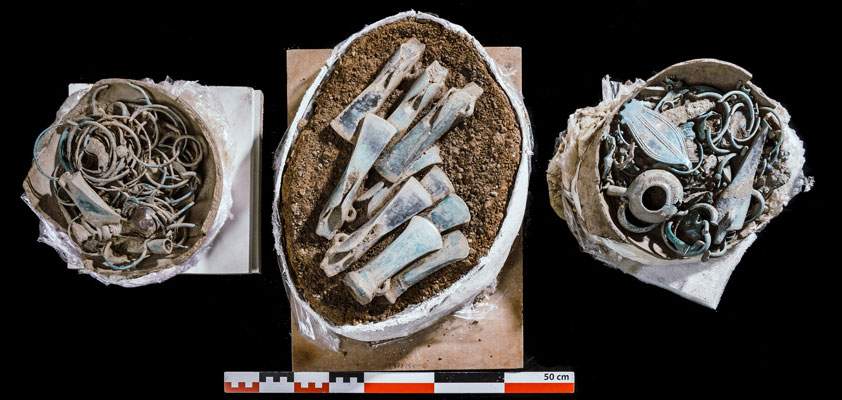In France, a team of archaeologists from the TRACES-UMR 5608 laboratory at theUniversity of Toulouse "Jean Jaurès,“ directed by Professor Pierre-Yves Milcent, has discovered a ”Bronze Age treasure" (so in a note) in the area of the Sioule gorges, near the town of Gannat, Allier department (about ten kilometers west of Vichy). It is a set of metal objects, dating to around 800 B.C., that constitute one of the largest groups of such metal objects ever found in Europe for the period to which they date.
The excavation that led to the discovery dates back to 2020: the objects (found in two different deposits) were analyzed through tomography and were then taken to the laboratory for further examination (which is still ongoing). Much evidence emerged: first, that both groups of objects were intact, and both had been placed in a decorated ceramic vessel each. In each of these two vessels, dozens of bronze objects were found, most of them whole: they are axes, knives, scythe blades, bracelets, anklets, pendants, decorated belts, daggers, spearheads, chariot parts and harnesses, horse trappings, but also objects whose function is not known. Also found were river stones, collected by color (in one jar white, in the other red). In both deposits the same types of objects were found, arranged in the same way and grouped identically (e.g., jewelry all together at the base of the jar, axe blades facing down, and so on).
Given the type of objects and the way they were allocated in the jars, archaeologists believe that this is evidence of rituals probably related to the founding or abandonment of a settlement (they were probably ritual offerings). According to experts, the study of these objects may shed new light on a particular phenomenon of the European Bronze Age, namely the deliberate deposit of metal objects in places that constitute neither burials nor shrines. This is a subject that has been debated since at least the 19th century, although a conclusion has never been reached because of the great rarity of such finds. Now, the discoveries made in Gannat allow for more documentation, and they also highlight how damaging the activity of grave robbers is who remove these treasures by dispersing them (in 2017, in fact, a similar deposit had been found by the authorities following a looting action and then acquired by the Musée d’Art et d’Archéologie Anne de Beaujeu in Moulins, also in the Allier department).
Excavations and studies carried out in the Gannat area and as part of the collective research project devoted to the south of the Allier during the protohistory and antiquity are organized by the University of Toulouse Jean Jaurès and the TRACES-UMR 5608 Laboratory, and carried out with the support of the Auvergne-Rhône-Alpes Regional Service of Archaeology, the Preventive Archaeology Service of the Allier department (SAPDA) and the Musée d’Art et d’Archéologie Anne de Beaujeu in Moulins.
Photo: C. Fresillon
 |
| France, archaeologists discover rare treasure trove of dozens of Bronze Age objects |
Warning: the translation into English of the original Italian article was created using automatic tools. We undertake to review all articles, but we do not guarantee the total absence of inaccuracies in the translation due to the program. You can find the original by clicking on the ITA button. If you find any mistake,please contact us.